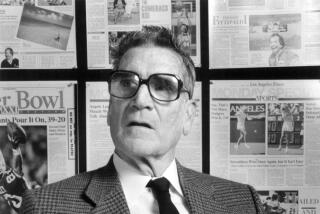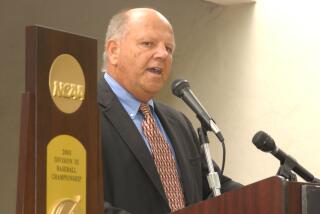Robert B. McCurry, 83; Chrysler executive introduced rebates
- Share via
Robert B. McCurry, an innovative automotive executive who pioneered cash rebates while at Chrysler and was a key force in establishing the Lexus division for Toyota, has died. He was 83.
McCurry, who maintained a residence in Palm Desert, died Monday of cancer at his home in Rehoboth Beach, Del., according to Joseph Tetherow, a spokesman for Toyota Motor Sales U.S.A.
For the record:
12:00 a.m. Nov. 16, 2006 For The Record
Los Angeles Times Thursday November 16, 2006 Home Edition Main News Part A Page 2 National Desk 1 inches; 48 words Type of Material: Correction
McCurry obituary: The obituary of auto executive Robert B. McCurry in Wednesday’s California section said that in 1986 Toyota became the first import automaker in the United States to sell more than 100,000 vehicles in a single year. The sentence should have said more than 1 million vehicles.
He was famous in the industry for his astute product sense, keen marketing focus and larger-than-life persona.
“The creation of the Chrysler rebates in the 1970s was a moment that changed the automotive industry forever,” said Chris Denove, vice president and executive director of J.D. Power and Associates.
“When today’s consumers see factory programs such as employee pricing or zero-percent financing, in a very real way they have McCurry to thank,” said Denove, who is the author of “Satisfaction: How Every Great Company Listens to the Voice of the Customer.”
After an influential career with Chrysler, McCurry joined Toyota in 1982 as general manager of the Los Angeles sales region. His influence as national sales chief grew as the carmaker’s popularity surged.
“He was also a friend to the dealer,” Denove said. “He understood the needs of the dealer community, and that can’t be said for every factory executive.”
By 1986, Toyota became the first import automaker in the United States to sell more than 100,000 vehicles in a single year.
McCurry told The Times some years ago that he taught the Japanese to make U.S. auto dealers happy so they would order more cars and push harder for sales.
“I’m a dealer-oriented guy,” McCurry said, “and that was a new arena for them. The aggressiveness didn’t bother them. They learned a new mode of operating, and I think they respected that.”
Many of his innovations were historic.
While general manager of Chrysler’s Dodge division, he helped organize a sales and distribution agreement with Mitsubishi Motors Corp. to take advance of that firm’s small, fuel-efficient vehicles.
Also with Dodge, he championed high-performance muscle cars like the Charger and Daytona. And he saw stock car racing as a way to sell street models. Dodge sponsored Richard Petty and David Pearson in NASCAR races on Sundays and saw their sales improve on Mondays.
He would later use that formula when he headed Chrysler’s Marine division, initiating a racing program that helped sell boats.
Faced with declining sales and growing inventories as Chrysler’s group vice president in charge of sales and marketing in late 1974, he came up with a sales idea that resonates today.
His solution featured sports personality Joe Garagiola and appeared in a commercial during halftime of the Super Bowl IX telecast Jan. 12, 1975.
In a carnival atmosphere, Garagiola told viewers: “Buy a car, get a check,” as $200 cash-back rebates were being offered on new Dodge Darts or Plymouth Dusters.
And although the initial rebates were modest by today’s standards, they set in place a practice by American carmakers that has grown over the years.
“It set consumer expectations to get something back from the automobile industry,” Denove said. “They were highly effective at the time, but over time consumers were expecting more and more.”
McCurry retired from Chrysler in 1978 as vice president for sales, parts and service for North America. Four years later, he joined Toyota and helped establish the Japanese firm as the leading importer in the United States.
According to Tetherow, it was McCurry who pushed for Toyota to develop a luxury line for the LS400, which Toyota had been working on with plans to merely add it to its fleet of vehicles. McCurry’s vision was to offer a higher-end luxury brand that early Toyota customers could graduate to as their financial situation improved. Lexus started with two models in 1989.
He also pushed Toyota to challenge Detroit’s Big 3 automakers in the full-size pickup truck market, which the Japanese firm did in 1993 with the introduction of the T100, which was followed in 1999 by the Tundra.
He was vice chairman of Toyota Motor Sales U.S.A. when he retired in 1993.
Born July 10, 1923, in Burnham, Pa., McCurry served in the Army Air Forces during World War II and enrolled at Michigan State after the war. Excellent at football, he played center on offense, linebacker on defense and was elected captain of the team for three years.
Drafted by the NFL’s Detroit Lions, he decided to finish school and, after graduating, began his 28-year career with Chrysler.
He started with the company in 1950 as a district manager in Green Bay, Wis., and worked his way quickly through the ranks. By 1960, he was the automaker’s general sales manager.
McCurry is survived by his wife of 61 years, Jane; two daughters; and four grandchildren.
Funeral services are scheduled for Friday at 11 a.m. at the Rehoboth Beach Country Club.
*






